The Shoes of Fortune - Hans Christian Andersen (the gingerbread man read aloud TXT) 📗
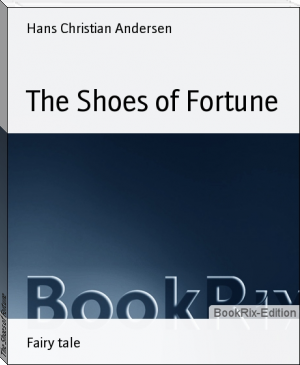
- Author: Hans Christian Andersen
Book online «The Shoes of Fortune - Hans Christian Andersen (the gingerbread man read aloud TXT) 📗». Author Hans Christian Andersen
where, of
course, the vapor is warmest. In this manner he ascends
gradually to the highest.
And so there he lay on the uppermost bank in the vapor-bath; but with all his clothes on, in his boots and galoshes, while the hot drops fell scalding from the ceiling on his face.
"Holloa!" cried he, leaping down. The bathing attendant, on his side, uttered a loud cry of astonishment when he beheld in the bath, a man completely dressed.
The other, however, retained sufficient presence of mind to whisper to him, "'Tis a bet, and I have won it!" But the first thing he did as soon as he got home, was to have a large blister put on his chest and back to draw out his madness.
The next morning he had a sore chest and a bleeding back; and, excepting the fright, that was all that he had gained by the Shoes of Fortune.
V. Metamorphosis of the Copying-Clerk
The watchman, whom we have certainly not forgotten, thought meanwhile of the galoshes he had found and taken with him to the hospital; he now went to fetch them; and as neither the lieutenant, nor anybody else in the street, claimed them as his property, they were delivered over to the police-office.*
*As on the continent, in all law and police practices nothing is verbal, but any circumstance, however trifling, is reduced to writing, the labor, as well as the number of papers that thus accumulate, is enormous. In a police-office, consequently, we find copying-clerks among many other scribes of various denominations, of which, it seems, our hero was one.
"Why, I declare the Shoes look just like my own," said one of the clerks, eying the newly-found treasure, whose hidden powers, even he, sharp as he was, was not able to discover. "One must have more than the eye of a shoemaker to know one pair from the other," said he, soliloquizing; and putting, at the same time, the galoshes in search of an owner, beside his own in the corner.
"Here, sir!" said one of the men, who panting brought him a tremendous pile of papers.
The copying-clerk turned round and spoke awhile with the man about the reports and legal documents in question; but when he had finished, and his eye fell again on the Shoes, he was unable to say whether those to the left or those to the right belonged to him. "At all events it must be those which are wet," thought he; but this time, in spite of his cleverness, he guessed quite wrong, for it was just those of Fortune which played as it were into his hands, or rather on his feet. And why, I should like to know, are the police never to be wrong? So he put them on quickly, stuck his papers in his pocket, and took besides a few under his arm, intending to look them through at home to make the necessary notes. It was noon; and the weather, that had threatened rain, began to clear up, while gaily dressed holiday folks filled the streets. "A little trip to Fredericksburg would do me no great harm," thought he; "for I, poor beast of burden that I am, have so much to annoy me, that I don't know what a good appetite is. 'Tis a bitter crust, alas! at which I am condemned to gnaw!"
Nobody could be more steady or quiet than this young man; we therefore wish him joy of the excursion with all our heart; and it will certainly be beneficial for a person who leads so sedentary a life. In the park he met a friend, one of our young poets, who told him that the following day he should set out on his long-intended tour.
"So you are going away again!" said the clerk. "You are a very free and happy being; we others are chained by the leg and held fast to our desk."
"Yes; but it is a chain, friend, which ensures you the blessed bread of existence," answered the poet. "You need feel no care for the coming morrow: when you are old, you receive a pension."
"True," said the clerk, shrugging his shoulders; "and yet you are the better off. To sit at one's ease and poetise—that is a pleasure; everybody has something agreeable to say to you, and you are always your own master. No, friend, you should but try what it is to sit from one year's end to the other occupied with and judging the most trivial matters."
The poet shook his head, the copying-clerk did the same. Each one kept to his own opinion, and so they separated.
"It's a strange race, those poets!" said the clerk, who was very fond of soliloquizing. "I should like some day, just for a trial, to take such nature upon me, and be a poet myself; I am very sure I should make no such miserable verses as the others. Today, methinks, is a most delicious day for a poet. Nature seems anew to celebrate her awakening into life. The air is so unusually clear, the clouds sail on so buoyantly, and from the green herbage a fragrance is exhaled that fills me with delight. For many a year have I not felt as at this moment."
We see already, by the foregoing effusion, that he is become a poet; to give further proof of it, however, would in most cases be insipid, for it is a most foolish notion to fancy a poet different from other men. Among the latter there may be far more poetical natures than many an acknowledged poet, when examined more closely, could boast of; the difference only is, that the poet possesses a better mental memory, on which account he is able to retain the feeling and the thought till they can be embodied by means of words; a faculty which the others do not possess. But the transition from a commonplace nature to one that is richly endowed, demands always a more or less breakneck leap over a certain abyss which yawns threateningly below; and thus must the sudden change with the clerk strike the reader.
"The sweet air!" continued he of the police-office, in his dreamy imaginings; "how it reminds me of the violets in the garden of my aunt Magdalena! Yes, then I was a little wild boy, who did not go to school very regularly. O heavens! 'tis a long time since I have thought on those times. The good old soul! She lived behind the Exchange. She always had a few twigs or green shoots in water—let the winter rage without as it might. The violets exhaled their sweet breath, whilst I pressed against the windowpanes covered with fantastic frost-work the copper coin I had heated on the stove, and so made peep-holes. What splendid vistas were then opened to my view! What change—what magnificence! Yonder in the canal lay the ships frozen up, and deserted by their whole crews, with a screaming crow for the sole occupant. But when the spring, with a gentle stirring motion, announced her arrival, a new and busy life arose; with songs and hurrahs the ice was sawn asunder, the ships were fresh tarred and rigged, that they might sail away to distant lands. But I have remained here—must always remain here, sitting at my desk in the office, and patiently see other people fetch their passports to go abroad. Such is my fate! Alas!"—sighed he, and was again silent. "Great Heaven! What is come to me! Never have I thought or felt like this before! It must be the summer air that affects me with feelings almost as disquieting as they are refreshing."
He felt in his pocket for the papers. "These police-reports will soon stem the torrent of my ideas, and effectually hinder any rebellious overflowing of the time-worn banks of official duties"; he said to himself consolingly, while his eye ran over the first page. "DAME TIGBRITH, tragedy in five acts." "What is that? And yet it is undeniably my own handwriting. Have I written the tragedy? Wonderful, very wonderful!—And this—what have I here? 'INTRIGUE ON THE RAMPARTS; or THE DAY OF REPENTANCE: vaudeville with new songs to the most favorite airs.' The deuce! Where did I get all this rubbish? Some one must have slipped it slyly into my pocket for a joke. There is too a letter to me; a crumpled letter and the seal broken."
Yes; it was not a very polite epistle from the manager of a theatre, in which both pieces were flatly refused.
"Hem! hem!" said the clerk breathlessly, and quite exhausted he seated himself on a bank. His thoughts were so elastic, his heart so tender; and involuntarily he picked one of the nearest flowers. It is a simple daisy, just bursting out of the bud. What the botanist tells us after a number of imperfect lectures, the flower proclaimed in a minute. It related the mythus of its birth, told of the power of the sun-light that spread out its delicate leaves, and forced them to impregnate the air with their incense—and then he thought of the manifold struggles of life, which in like manner awaken the budding flowers of feeling in our bosom. Light and air contend with chivalric emulation for the love of the fair flower that bestowed her chief favors on the latter; full of longing she turned towards the light, and as soon as it vanished, rolled her tender leaves together and slept in the embraces of the air. "It is the light which adorns me," said the flower.
"But 'tis the air which enables thee to breathe," said the poet's voice.
Close by stood a boy who dashed his stick into a wet ditch. The drops of water splashed up to the green leafy roof, and the clerk thought of the million of ephemera which in a single drop were thrown up to a height, that was as great doubtless for their size, as for us if we were to be hurled above the clouds. While he thought of this and of the whole metamorphosis he had undergone, he smiled and said, "I sleep and dream; but it is wonderful how one can dream so naturally, and know besides so exactly that it is but a dream. If only to-morrow on awaking, I could again call all to mind so vividly! I seem in unusually good spirits; my perception of things is clear, I feel as light and cheerful as though I were in heaven; but I know for a certainty, that if to-morrow a dim remembrance of it should swim before my mind, it will then seem nothing but stupid nonsense, as I have often experienced already—especially before I enlisted under the banner of the police, for that dispels like a whirlwind all the visions of an unfettered imagination. All we hear or say in a dream that is fair and beautiful is like the gold of the subterranean spirits; it is rich and splendid when it is given us, but viewed by daylight we find only withered leaves. Alas!" he sighed quite sorrowful, and gazed at the chirping birds that hopped contentedly from branch to branch, "they are much better off than I! To fly must be a heavenly art; and happy do I prize that creature in which it is innate. Yes! Could I exchange my nature with any other creature, I fain would be such a happy little lark!"
He had hardly uttered these hasty words when the skirts and sleeves of his coat folded themselves together into wings; the clothes became feathers, and the galoshes claws. He observed it perfectly, and laughed in his heart.
course, the vapor is warmest. In this manner he ascends
gradually to the highest.
And so there he lay on the uppermost bank in the vapor-bath; but with all his clothes on, in his boots and galoshes, while the hot drops fell scalding from the ceiling on his face.
"Holloa!" cried he, leaping down. The bathing attendant, on his side, uttered a loud cry of astonishment when he beheld in the bath, a man completely dressed.
The other, however, retained sufficient presence of mind to whisper to him, "'Tis a bet, and I have won it!" But the first thing he did as soon as he got home, was to have a large blister put on his chest and back to draw out his madness.
The next morning he had a sore chest and a bleeding back; and, excepting the fright, that was all that he had gained by the Shoes of Fortune.
V. Metamorphosis of the Copying-Clerk
The watchman, whom we have certainly not forgotten, thought meanwhile of the galoshes he had found and taken with him to the hospital; he now went to fetch them; and as neither the lieutenant, nor anybody else in the street, claimed them as his property, they were delivered over to the police-office.*
*As on the continent, in all law and police practices nothing is verbal, but any circumstance, however trifling, is reduced to writing, the labor, as well as the number of papers that thus accumulate, is enormous. In a police-office, consequently, we find copying-clerks among many other scribes of various denominations, of which, it seems, our hero was one.
"Why, I declare the Shoes look just like my own," said one of the clerks, eying the newly-found treasure, whose hidden powers, even he, sharp as he was, was not able to discover. "One must have more than the eye of a shoemaker to know one pair from the other," said he, soliloquizing; and putting, at the same time, the galoshes in search of an owner, beside his own in the corner.
"Here, sir!" said one of the men, who panting brought him a tremendous pile of papers.
The copying-clerk turned round and spoke awhile with the man about the reports and legal documents in question; but when he had finished, and his eye fell again on the Shoes, he was unable to say whether those to the left or those to the right belonged to him. "At all events it must be those which are wet," thought he; but this time, in spite of his cleverness, he guessed quite wrong, for it was just those of Fortune which played as it were into his hands, or rather on his feet. And why, I should like to know, are the police never to be wrong? So he put them on quickly, stuck his papers in his pocket, and took besides a few under his arm, intending to look them through at home to make the necessary notes. It was noon; and the weather, that had threatened rain, began to clear up, while gaily dressed holiday folks filled the streets. "A little trip to Fredericksburg would do me no great harm," thought he; "for I, poor beast of burden that I am, have so much to annoy me, that I don't know what a good appetite is. 'Tis a bitter crust, alas! at which I am condemned to gnaw!"
Nobody could be more steady or quiet than this young man; we therefore wish him joy of the excursion with all our heart; and it will certainly be beneficial for a person who leads so sedentary a life. In the park he met a friend, one of our young poets, who told him that the following day he should set out on his long-intended tour.
"So you are going away again!" said the clerk. "You are a very free and happy being; we others are chained by the leg and held fast to our desk."
"Yes; but it is a chain, friend, which ensures you the blessed bread of existence," answered the poet. "You need feel no care for the coming morrow: when you are old, you receive a pension."
"True," said the clerk, shrugging his shoulders; "and yet you are the better off. To sit at one's ease and poetise—that is a pleasure; everybody has something agreeable to say to you, and you are always your own master. No, friend, you should but try what it is to sit from one year's end to the other occupied with and judging the most trivial matters."
The poet shook his head, the copying-clerk did the same. Each one kept to his own opinion, and so they separated.
"It's a strange race, those poets!" said the clerk, who was very fond of soliloquizing. "I should like some day, just for a trial, to take such nature upon me, and be a poet myself; I am very sure I should make no such miserable verses as the others. Today, methinks, is a most delicious day for a poet. Nature seems anew to celebrate her awakening into life. The air is so unusually clear, the clouds sail on so buoyantly, and from the green herbage a fragrance is exhaled that fills me with delight. For many a year have I not felt as at this moment."
We see already, by the foregoing effusion, that he is become a poet; to give further proof of it, however, would in most cases be insipid, for it is a most foolish notion to fancy a poet different from other men. Among the latter there may be far more poetical natures than many an acknowledged poet, when examined more closely, could boast of; the difference only is, that the poet possesses a better mental memory, on which account he is able to retain the feeling and the thought till they can be embodied by means of words; a faculty which the others do not possess. But the transition from a commonplace nature to one that is richly endowed, demands always a more or less breakneck leap over a certain abyss which yawns threateningly below; and thus must the sudden change with the clerk strike the reader.
"The sweet air!" continued he of the police-office, in his dreamy imaginings; "how it reminds me of the violets in the garden of my aunt Magdalena! Yes, then I was a little wild boy, who did not go to school very regularly. O heavens! 'tis a long time since I have thought on those times. The good old soul! She lived behind the Exchange. She always had a few twigs or green shoots in water—let the winter rage without as it might. The violets exhaled their sweet breath, whilst I pressed against the windowpanes covered with fantastic frost-work the copper coin I had heated on the stove, and so made peep-holes. What splendid vistas were then opened to my view! What change—what magnificence! Yonder in the canal lay the ships frozen up, and deserted by their whole crews, with a screaming crow for the sole occupant. But when the spring, with a gentle stirring motion, announced her arrival, a new and busy life arose; with songs and hurrahs the ice was sawn asunder, the ships were fresh tarred and rigged, that they might sail away to distant lands. But I have remained here—must always remain here, sitting at my desk in the office, and patiently see other people fetch their passports to go abroad. Such is my fate! Alas!"—sighed he, and was again silent. "Great Heaven! What is come to me! Never have I thought or felt like this before! It must be the summer air that affects me with feelings almost as disquieting as they are refreshing."
He felt in his pocket for the papers. "These police-reports will soon stem the torrent of my ideas, and effectually hinder any rebellious overflowing of the time-worn banks of official duties"; he said to himself consolingly, while his eye ran over the first page. "DAME TIGBRITH, tragedy in five acts." "What is that? And yet it is undeniably my own handwriting. Have I written the tragedy? Wonderful, very wonderful!—And this—what have I here? 'INTRIGUE ON THE RAMPARTS; or THE DAY OF REPENTANCE: vaudeville with new songs to the most favorite airs.' The deuce! Where did I get all this rubbish? Some one must have slipped it slyly into my pocket for a joke. There is too a letter to me; a crumpled letter and the seal broken."
Yes; it was not a very polite epistle from the manager of a theatre, in which both pieces were flatly refused.
"Hem! hem!" said the clerk breathlessly, and quite exhausted he seated himself on a bank. His thoughts were so elastic, his heart so tender; and involuntarily he picked one of the nearest flowers. It is a simple daisy, just bursting out of the bud. What the botanist tells us after a number of imperfect lectures, the flower proclaimed in a minute. It related the mythus of its birth, told of the power of the sun-light that spread out its delicate leaves, and forced them to impregnate the air with their incense—and then he thought of the manifold struggles of life, which in like manner awaken the budding flowers of feeling in our bosom. Light and air contend with chivalric emulation for the love of the fair flower that bestowed her chief favors on the latter; full of longing she turned towards the light, and as soon as it vanished, rolled her tender leaves together and slept in the embraces of the air. "It is the light which adorns me," said the flower.
"But 'tis the air which enables thee to breathe," said the poet's voice.
Close by stood a boy who dashed his stick into a wet ditch. The drops of water splashed up to the green leafy roof, and the clerk thought of the million of ephemera which in a single drop were thrown up to a height, that was as great doubtless for their size, as for us if we were to be hurled above the clouds. While he thought of this and of the whole metamorphosis he had undergone, he smiled and said, "I sleep and dream; but it is wonderful how one can dream so naturally, and know besides so exactly that it is but a dream. If only to-morrow on awaking, I could again call all to mind so vividly! I seem in unusually good spirits; my perception of things is clear, I feel as light and cheerful as though I were in heaven; but I know for a certainty, that if to-morrow a dim remembrance of it should swim before my mind, it will then seem nothing but stupid nonsense, as I have often experienced already—especially before I enlisted under the banner of the police, for that dispels like a whirlwind all the visions of an unfettered imagination. All we hear or say in a dream that is fair and beautiful is like the gold of the subterranean spirits; it is rich and splendid when it is given us, but viewed by daylight we find only withered leaves. Alas!" he sighed quite sorrowful, and gazed at the chirping birds that hopped contentedly from branch to branch, "they are much better off than I! To fly must be a heavenly art; and happy do I prize that creature in which it is innate. Yes! Could I exchange my nature with any other creature, I fain would be such a happy little lark!"
He had hardly uttered these hasty words when the skirts and sleeves of his coat folded themselves together into wings; the clothes became feathers, and the galoshes claws. He observed it perfectly, and laughed in his heart.
Free e-book «The Shoes of Fortune - Hans Christian Andersen (the gingerbread man read aloud TXT) 📗» - read online now
Similar e-books:

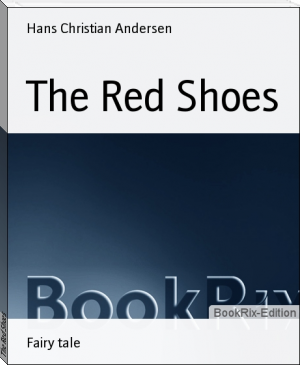
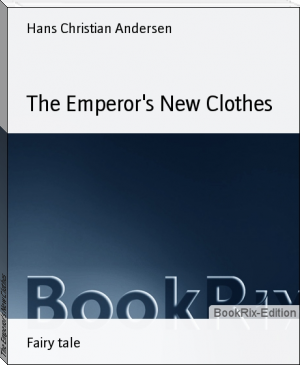
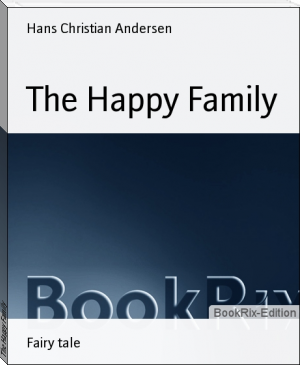
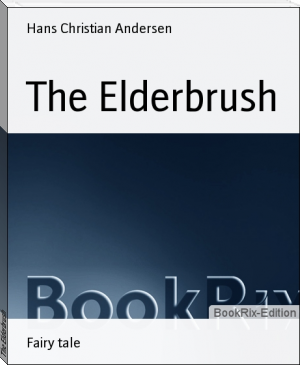
Comments (0)